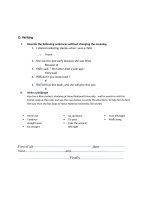Tips on Writing Your Independent College Essay
Bạn đang xem bản rút gọn của tài liệu. Xem và tải ngay bản đầy đủ của tài liệu tại đây (175.61 KB, 3 trang )
Writing Your Admissions Essay
Not all colleges require an admissions essay, but for
those that do, your college admissions essay is one
of the most important parts of your college
application. When an admissions counselor reads
your essay, you become more than a compilation of
test scores and transcripts. You become a unique
individual with skills and talents to contribute to a
college campus.
This publication provides guidelines for composing
your college admissions essay, including tips for
getting started, following directions, engaging the
reader, and avoiding pitfalls.
Types of Admissions Essays
Structured Question:
Speaking about education, Dr. Martin Luther King
once said, "The function of education is to teach one
to think intensively and to think critically. Intelligence
plus character—that is the goal of true education."
Dr. King suggests that critical thinking results in our
ability to inform intelligence with character, and
strengthen character with intelligence. Please talk
about a situation that demanded critical thinking from
you, and how your choices or decisions integrated
intelligence and character.
– Loyola Marymount University
Getting Started
There are two types of admissions essays. The first
type is a personal statement. This essay is general
in nature and gives you the opportunity to tell an
admissions counselor more about yourself or about
events and people that have influenced you.
The second type of admissions essay requires you
to answer a specific question with a more structured
response. These questions cover a wide range of
topics and can be creative, analytical, or
philosophical.
Personal Statement:
Describe a character in fiction, a historical figure, or
a creative work (as in art, music, science, etc.) that
has had an influence on you, and explain that
influence
- University of the Pacific
What are your expectations of a college education?
In what ways do you hope to grow or change?
If you are applying to more than one school, you
might have to write several essays. The first step is
determining how many essays you need and making
a schedule based on your writing speed and skill.
For example, you might allow yourself one week per
essay, so plan on three weeks for three essays.
Begin the writing process by brainstorming. Ask
yourself what interests and excites you about the
topic. Write down anything that occurs to you,
knowing you can always eliminate it later. When you
brainstorm, ideas build upon each other. Something
that may seem boring at first glance can become
very interesting as you write about it completely.
Don’t be afraid of less traditional topics such as
failure or frustration. Sometimes writing about
situations when you have overcome obstacles
reveals your true character and values. These topics
can also reveal valuable qualities such as maturity
and self-awareness.
(A note of caution: be sure to be generally positive in
order to avoid sounding as if you are complaining or
appealing for sympathy.)
- Mills College
– Mills College
Show, don’t tell. Try to capture people, places,
events, and feelings in words so a reader can
visualize and respond to them. Illustrate your points
with examples and specific descriptive details. For
instance, don’t just say that you’re a leader. Show
your leadership with life experiences and stories
instead.
If you are stuck, consider reading some sample
essays available in books and on the Internet. Other
essays can provide inspiration or give you a
jumpstart on your topic. Remember that essay
readers are trained to spot plagiarism, so don’t try to
imitate another essay. Use the samples only as a
tool to help you find your own words.
Following Directions
To keep the reader engaged, use present tense,
active verbs, and other descriptive language; give
interesting details and facts; and if possible, use all
the senses in your descriptions. How did something
look? How did it sound? How did it feel, smell, taste?
Remember you are not writing an assignment for a
grade; you are writing an essay for a reader to
appreciate. Admissions officers want to read what
you want to write, not what you think they want
to read.
Your essay provides an abundance of information to
an admissions counselor, including how well you can
follow directions. If the application asks for one
page, then attach only one page. If the application
provides a space in which to write your essay, fill the
whole space. If the application doesn’t give specific
requirements, aim for 1-2 double-spaced, typed
pages. Make sure you use an easy-to-read font and
type size, such as black 12-point Times Roman.
Finally, don’t be tempted to write one general essay
and send it with all your applications. If a college
asks a specific question, be sure to answer THAT
question.
Avoiding Pitfalls
Do not use your essay to summarize activities and
achievements you’ve already listed on the
application. Although you may decide to write your
essay on a personal experience or achievement,
avoid writing an essay that merely summarizes
information presented elsewhere in your application.
Keeping the Reader Engaged
Think creatively. Because your essay is one of
hundreds to be read by admissions counselors, it
needs to make an impression. Focus on what you
are excited and passionate about. The best strategy
is to reveal your genuine self, and it will make the
writing process more fun. Your goal is to get the
reader to remember you favorably. Be honest and
sincere, and let your individual voice and personality
separate you from the crowd.
Be original, but not gimmicky. For example, do not
write your essay in an unusual, “clever” format just to
be different. Leave out language a reader might not
understand, such as jargon and technical terms.
Stick with the truth. This may seem obvious, but it
can be tempting to stretch the truth when you are
trying to impress someone. Remember that the
purpose of the admissions essay is to let a reader
know what sort of person you really are.
Try to grab the reader’s attention with a great
opening sentence. Be bold and colorful. If it
succeeds, the reader will be encouraged to continue.
Don’t feel pressure, however, to have a brilliant
opening line before you begin to compose the body
of your essay. Often it’s best to do a draft of the
entire essay and then return to the opening
sentence. It might be easier to write an attentiongrabbing first line when the following paragraphs are
already on the page.
Do not hire a professional writing coach or get
excessive help from your parents. Admissions
counselors are trained to spot plagiarism and writing
that does not sound like the applicant.
2
Stick to vocabulary that is familiar to you. If you rely
too heavily on a thesaurus in search of bigger and
better-sounding
words,
you
risk
sounding
pretentious as well as unintentionally misusing
words.
Write several drafts. Polish and proofread for
positive results. Read your writing repeatedly for
errors in spelling and grammar. Reading the essay
aloud is helpful. Ask a few good proofreaders to
check your writing for mistakes, since it’s easy to
miss errors in your own writing. Also ask them to
point out any passages that are vague or unclear.
Do not underestimate the importance of grammatical
correctness. Represent your ideas in the best light
by checking your essay thoroughly for correct usage,
spelling, and punctuation.
Sample Essay Question:
What do you consider to be one of the most urgent
social or political issues of our time? What do you
believe we should do in response to this?
– University of La Verne
3









